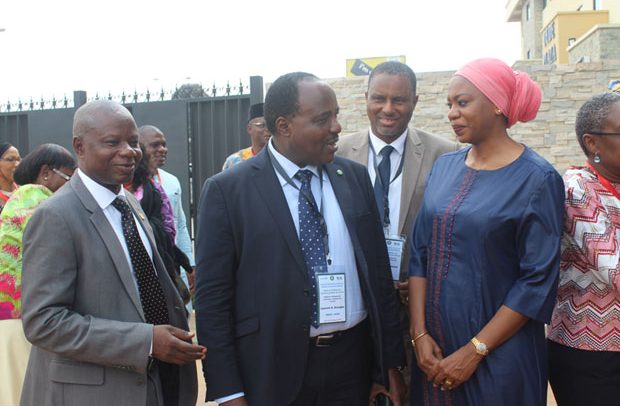From left: Hamid Adakurugu, Dr Laurent A. Assogba and Mam Tut Wadda in a discussion after the opening ceremony
The West African Health Organisation (WAHO) has held a two-day workshop for health experts to validate nutrition curricular for health professionals and agriculture schools in the sub-region.
The workshop, held in Accra, was attended by nutritionists, nurses, midwives, doctors and agronomists from WAHO.
It was to make clearer WAHO’s role in ending malnutrition in West Africa which include the development of a nutrition curricular for capacity building and skills development in nutrition and food security in sub-region.
It was also to provide experts the opportunity to discuss the gaps in the training curricula and come up with strategies to improve nutrition education in West Africa.
Welcoming participants to the workshop, Dr Laurent A. Assogba, Deputy Director General of WAHO, said malnutrition affects the vulnerable in society, especially children, putting them at risk of diseases and sometimes death.
He said WAHO in line with supporting governments’ efforts to address the malnutrition challenge recruited three consultants to develop curricula for standalone nutrition programmes and nutrition modules for health professionals.
Dr Assogba, however, mentioned that due to challenges involved in implementing the curricula developed with funding from the African Development Bank and support from UNICEF, the organisation held the validation workshop to look at how best the curricula can be streamlined into educational programmes in West Africa.
“It is my hope that we will come out of this meeting with solutions on how best we can integrate the curricula in our various health institutions,” he said
Health Minister Kwaku Agyeman-Manu, in a speech read on his behalf by Hamid Adakurugu, Director of Administration and Legal, MoH, urged participants to base their recommendations on policies that positions nutrition as a cross cutting developmental issue.
“Such a policy would provide guidance in determining the content of any nutrition training curricular that we may develop,” he said
Mam Tut Wadda, Acting Country Manager, ADB, complimented WAHO for how far they have come with the development of the curricula.
She said ADB’s decision to support WAHO is part of the bank’s effort to support institutions to address malnutrition on the continent.
Mrs Wadda stressed the bank’s commitment to working with partners to ensure the success of their larger programme which seeks to end hunger and malnutrition in Africa by 2025.
By Jamila Akweley Okertchiri


